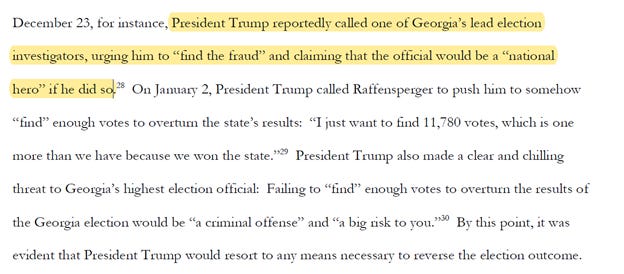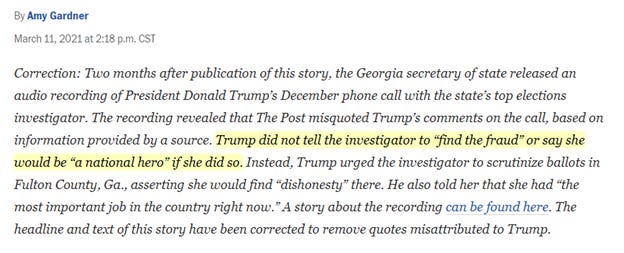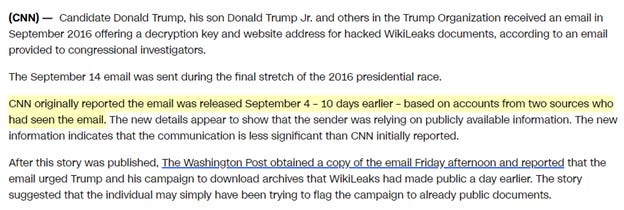
by Techno Fog at Technofog Substack
Protecting anonymous sources – or covering-up government misconduct?
Imagine you’re a major media outlet like The Washington Post or CNN. You have a huge platform on the web, in print, or on TV. You publish consequential stories with information from anonymous sources on Trump/Russia collusion, an email Donald Trump, Jr. received about a Wikileaks release, and President Trump’s instructions to a Georgia election investigator to “find the fraud.” Your stories shape agendas and become national news. They fuel conspiracies, divide Americans, and influence elections.
And then you realize you’ve been played. Your anonymous sources gave you false information. You have to issue a correction. Why should that be the end of the story?
Fake News and “Find the Fraud”
On January 9, 2021 The Washington Post published a story that President Trump ordered a Georgia election investigator looking into 2020 election irregularities to “find the fraud” in a late December phone call.
This purported call was pushed by Washington Post reporters to further allegations of criminal obstruction of justice. A serious crime, if true.
The case for impeachment grows by the minute:
Exclusive – ‘Find the fraud’: Trump pressured a Georgia elections investigator in a separate call legal experts say could amount to obstruction @amyegardner https://t.co/ZloXeWLg87
— Greg Miller (@gregpmiller) January 9, 2021
House Democrats even cited this reporting in their trial brief:
Today, The Washington Post issued a significant and concerning correction.
This Washington Post correction was necessitated by the release of an audio recording, which showed that Trump’s comments on the call were misquoted “based on information provided by a source.”
This isn’t the end of the story, however. There’s still a story and it’s a good one. It has to do with the anonymous source who lied about Trump’s call – potentially for political gain.
In other words, the question still remains:
Who is the source that lied about Trump’s call with the Georgia election investigator?
The Washington Post doesn’t say. Others have suggested the general source of the leak: The Georgia Secretary of State’s office. The name eludes us. But if Mr. Shafer’s tweet is true, what a story that would be.
The Secretary of State’s office secretly recorded the conversation, mischaracterized its contents to The Washington Post and then attempted to delete the recording. It was recently discovered in a laptop “trash” folder as part of an open records search.
— David Shafer (@DavidShafer) March 15, 2021
Anonymous Sources and CNN
This isn’t the first time the media has been burned by an anonymous source. Remember the entirety of the Trump/Russia investigation?
Granted, that gives us a lot to choose from. I’ll be more specific.
Back in December 2017, CNN reported that Trump Jr. received an email regarding a Wikileaks release on September 4, 2016. This date – 9/4/2016 – was significant because it was 10 days before the Wikileaks release of the hacked DNC materials. CNN had its smoking gun. It had evidence that Trump Jr, and by extension the Trump Campaign, had advance notice of the hacked DNC documents. Until it didn’t.
Other outlets, including The Washington Post, NBC News, and The Wall Street Journal cleaned up CNN’s mess, reporting that the email was actual sent on September 14, 2016. This was significant because the correct date showed the email to Trump Jr. was sent based on “publicly available information.”
Who burned CNN? According to CNN’s own reporting, it was “two sources who had seen the email.”
CNN never disclosed its sources. It made a correction and went on. In doing so, CNN killed an important story: the names of the government officials who lied about collusion.
A Pattern Emerges…
Continue Reading


